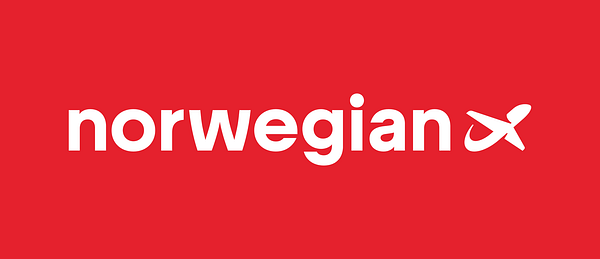
Press release -
The Norwegian Group with capacity ramp-up in 2024
For 2024, the Norwegian Group delivered an operating profit (EBIT) of NOK 1,873 million, the second highest in company history. The fourth quarter resulted in a negative operating result (EBIT) of NOK 93 million, impacted by the weakening NOK against USD. The year included a highly successful acquisition of Widerøe, as well as a significant capacity growth throughout the year.
The Norwegian Group had 6.2 million passengers in the quarter, of which 5.2 million were passengers of Norwegian and 1.0 million of Widerøe. Compared to the same period in 2023, the number of passengers increased by 480,000 for Norwegian and 126,000 for Widerøe. In the fourth quarter, Norwegian’s capacity (ASK) increased by 19 percent, while Widerøe’s capacity increased by four percent. Despite increasing capacity extensively throughout the last quarter, Norwegian still managed to deliver a load factor of 84.2 percent, only 0.2 percentage points down from the same period in 2023. Widerøe increased its load factor by almost five percentage points to 72.9 percent. For the full year of 2024, Norwegian had 22.6 million passengers, up ten percent from 2023. Widerøe had 3.8 million passengers in 2024, setting a new passenger record for the regional carrier in its 90-year history.
“Overall, we are pleased with the hard work across the Group and are encouraged by the year-on-year growth in passenger numbers. This demonstrates the strong demand for our product and the appreciation our new and returning customers have for travelling with Norwegian. The increase in our business segment is encouraging, and we look forward to continuing to integrate Widerøe’s product offering to further enhance this segment. In addition, I am glad to see Boeing’s production progress, having received three new 737 MAX 8 this year,” said Geir Karlsen, CEO of Norwegian.
The fourth quarter featured a major event in aviation sustainability. On 17 October, the largest voluntary biofuel agreement in Norwegian aviation history took place with the ceremonial first refuelling of the defence sector’s business trips with Norwegian. In December, the advocacy group Transport & Environment ranked Norwegian among the top three airlines globally for its commitment to sustainable aviation fuel.
Norwegian’s punctuality, measured by the share of flights departing on schedule, was 78.4 percent in the quarter, while it was 77.5 percent for Widerøe. Regularity was 99.1 percent and 92.6 percent for Norwegian and Widerøe respectively. Operational performance for both airlines was negatively affected by adverse winter weather and operational issues.
Looking ahead to 2025
Norwegian projects that its fleet will be at 88 aircraft for the peak summer 2025 season, with a forecasted low single-digit growth in production for the year.
“The upside of the weak local currency is that it brings about increased tourism to the Nordics. Norwegian and Widerøe are uniquely positioned to capitalise on this. In 2025, we will therefore continue our work to improve our product offering, and strengthen our efforts to reduce costs and increase efficiency,” said Geir Karlsen.
The Board of Directors intends to propose to the Annual General Meeting of 2025 a distribution of profits of NOK 0.60 per share for 2024, to be paid out either through dividend or buy-back of shares. The proposed distribution corresponds to an aggregate amount of NOK 580 million and a payout ratio of 48 percent. Distribution of profits for 2024 is subject to certain conditions in the company’s debt instruments.
In the fourth quarter, the Oslo District Court ruled fully in Norwegian’s favour regarding its 2020 EU ETS obligations. The court found that Norwegian is entitled to fulfil these obligations by offering a dividend and that the penalty of almost NOK 400 million was unlawful. Norwegian is entitled to a full refund of the penalty amount plus interest if the decision becomes final. The Ministry of Climate and Environment has appealed the ruling.
Topics
Categories
About Norwegian
The Norwegian group is a leading Nordic aviation company, headquartered at Fornebu outside Oslo, Norway. The company has over 8,200 employees and owns two of the prominent airlines in the Nordics: Norwegian Air Shuttle and Widerøe’s Flyveselskap. Widerøe was acquired by Norwegian in 2024, aiming to facilitate seamless air travel across the two airline’s networks.
Norwegian Air Shuttle, the largest Norwegian airline with around 4,700 employees, operates an extensive route network connecting Nordic countries to key European destinations. In 2024, Norwegian carried 22,6 million passengers and maintained a fleet of 86 Boeing 737-800 and 737 MAX 8 aircraft.
Widerøe’s Flyveselskap, Norway’s oldest airline, is Scandinavia’s largest regional carrier. The airline has more than 3,500 employees. Mainly operating the short-runway airports in rural Norway, Widerøe operates several state contract routes (PSO routes) in addition to its own commercial network. In 2024, the airline had 3.8 million passengers and a fleet of 49 aircraft, including 46 Bombardier Dash 8’s and three Embraer E190-E2's. Widerøe Ground Handling provides ground handling services at 41 Norwegian airports.
The Norwegian group has sustainability as a key priority and has committed to significantly reducing carbon emissions from its operations. Among numerous initiatives, the most noteworthy is the investment in production and use of fossil-free aviation fuel (SAF). Norwegian strives to become the sustainable choice for its passengers, actively contributing to the transformation of the aviation industry.


